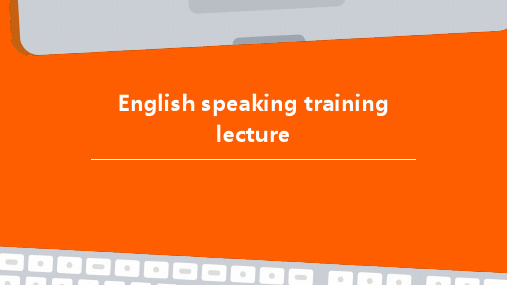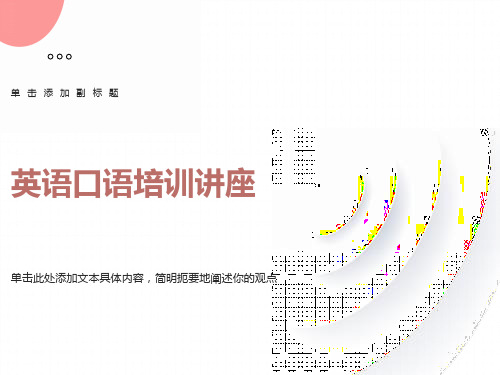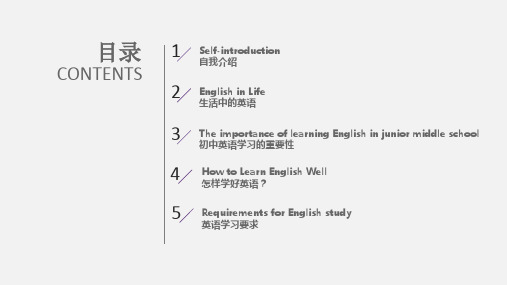最新英语培训课件上课讲义
英语口语培训讲座PPT课件

English Speaking in the Workplace
Career development
In many industries, English speaking ability is an important factor in career development, which can help you stand out in competition.
Reading accumulation
Read English original works, news reports, etc., increase vocabulary, and improve language organization ability.
Recite good sentences
Difficiencies in grammar and presence structure
• Summary words: Difficulties in grammar and sentence structure
Difficiencies in grammar and presence structure
Engage in daily conversations with native English speakers to improve oral expression and responsiveness.
Participate in English corner
Participate in English corner or language exchange activities, practice with people who also want to improve their English.
英语口语培训讲座PPT

Dialogue 4 A: Have a nice weekend! B: Thanks. You too!. A: Do you have any plans? B: Another day, another dollar. (和往常一样)
汇报日期
01
02
03
你认识……?
Do you know……
2
It’s been lovely to see you again.
3
Look forward to seeing you again.
4
祝你万事如意
All the best.
Best wishes.
Regards to your parents.
4
Send your parents my best.
Are you leaving for Guangzhou soon?
I guess so. Perhaps next Monday.
Dialogue 2 How are you getting along? I haven’t seen much of you lately. Keeping busy. Doing what? I am supposes to give you my oral defense(答辩) tomorrow. A: Well, keeping busy before oral defense is all in day’s work. be all in day’s work:不足为奇,司空见惯
汇报日期
感谢您的观看
Dialogue 2 A: I must run along now. I’ve enjoyed this evening very much. B: It was a pleasure having you. A: Every success with your research project. I hope it goes well. B: Thank. Take care then.
英语培训课件锦集1)ppt精品模板分享(带动画)

语境记忆法:将单词放入句子或短文中,通过上下文理解记忆 反复复习法:多次重复复习,加深记忆印象
词类:名词、动词、形容词等 时态:现在时、过去时、将来时等 语态:主动语态、被动语态 句子结构:简单句、复合句、并列句等
口语练习的重要性 口语练习的方法和技巧 口语练习的实践应用 口语练习的注意事项
添加标题
识别作者观点和态度
添加标题
添加标题
推断和推测作者意图和隐含意义
掌握基本语法和词汇 多读多写,提高写作水平 注意文章结构和逻辑性 避免中式英语,保持地道表达
了解考试内容和形 式
提高听力和口语能 力
掌握阅读和写作技 巧
制定备考计划并坚 持执行
了解考试内容和形式
提高语言能力
制定备考计划
参加模拟考试
个性化教学:根据学生的不同需求和特点,采用个性化的教学方法,满足学生的 个性化需求。
评价学生表现:观察学 生的课堂参与度、口语 表达、写作等方面,及 时给予反馈和指导
反思教学方法:根据学 生的反馈和教学效果, 不断调整和改进教学方 法,提高教学效果
了解评价标准:熟悉 各种英语考试的评价 标准和要求,以便更 好地指导学生备考
制定学习计划:根据个人情况,制定长期和短期的学习计划 执行学习计划:按照计划,逐步推进学习进程 调整学习计划:根据学习进度和效果,适时调整学习计划 坚持与自律:保持学习的坚持和自律,确保计划的顺利执行
教材与辅导书:选 择适合的教材和辅 导书,进行系统学 习
网络资源:利用英 语学习网站、在线 课程等资源,提高 学习效率
英语电影的起源与发展 经典英语电影及其文化内涵 英语电影中的音乐与配乐 英语电影与音乐欣赏的技巧和方法
少儿英语培训教育讲课PPT课件

少儿英语
儿/童/英/语/教/育/培/训/课/件
汇报人:XXX 汇报时间:20XX
书房的角落,挺立着一株虎尾兰。它 没有牡 丹的高 贵,没 有百合 花的幽 香,更 没有玫 瑰花那 样高傲 ,它除 了平凡 ,还是 平凡。 以至于 客人来 访,也 无一夸 赞过它 ,更没 有谁欣 赏它。 书房的角落,挺立着一株虎尾兰。它 没有牡 丹的高 贵,没 有百合 花的幽 香,更 没有玫 瑰花那 样高傲 ,它除 了平凡 ,还是 平凡。 以至于 客人来 访,也 无一夸 赞过它 ,更没 有谁欣 赏它。
Requirements for English study
How to Learn English Well
The importance of learning English in junior middle school English in Life Self-introduction
01
Made in China
中国制造
Exit
出口
Hamburger
汉堡包
WC
卫生间
书房的角落,挺立着一株虎尾兰。它 没有牡 丹的高 贵,没 有百合 花的幽 香,更 没有玫 瑰花那 样高傲 ,它除 了平凡 ,还是 平凡。 以至于 客人来 访,也 无一夸 赞过它 ,更没 有谁欣 赏它。 书房的角落,挺立着一株虎尾兰。它 没有牡 丹的高 贵,没 有百合 花的幽 香,更 没有玫 瑰花那 样高傲 ,它除 了平凡 ,还是 平凡。 以至于 客人来 访,也 无一夸 赞过它 ,更没 有谁欣 赏它。
英语培训课件锦集1)ppt

Watching movies and TV shows in English can help students understand different accounts and colonialisms The courseware provides some suggestions for movies and TV shows that are suitable for beginners
Main Idea questions
These questions ask about the overall meaning or main point of the passage
Inference questions
These questions ask about information that is not directly stated in the passage but can be inferred from the text
Recommended reading materials
Children's books
These books have simple language and engaging stories that are easy for beginners to understand
Magazines
Paraphrasing
Paraphrasing is the ability to restore information in your own words to ensure understanding
Summarizing
Summarizing is the ability to condense a passage into a brief summary that captures the main points
最新剑桥少儿英语教师培训讲座PPT课件

有意义的互动
Meaningful interaction
轻松的氛围
Stress-free atmosphere
积极的强化
Positive reinforcement
充分的参与
CleAar的doe兴bqju趣eactteives involvement
16
External Conditions for CYLE
naturally
29
Constructivist approach建构主义途径
Focus: child as an individual trying to make sense to the world
Each child is an active explorer A child tends to move in directions that have
教学法方法适应儿童发展 阶段
• Active, hands-on动手活动 • Multi-dimensional learning
22
3. Make the learning relevant to children’s interests and perspective
学习结合儿童的兴趣和认识
• Concrete vocabulary具体的词汇 • Here-and-now content身边的内容 • Start where children are
Understandable input 可理解的输入 Correct demonstration 正确的示范 Meaningful interaction 有意义的互动 Adequate involvement 充分的参与 Stress-free atmosphere 轻松的氛围 Positive reinforcement 积极的强化
初中英语培训教学课件

03
Analysis of English Vocabulary and Grammar
Common vocabulary classification memory method
Word formation
Understanding the basic structure of words, such as roots, prefixes, and suffixes, can help students expand their vocabulary effectively
02
Develop a sense of responsibility and autonomy in
language learning
Enhance open mindedness and respect for diverse
03
cultures and viewpoints
Cross cultural communication competence goals
Practicing introduction
Introduction refers to the rise and fall of the voice when speaking It contains important information about the speaker's identity and intent Practicing integration can help make speech more expressive and engaging
01
02
03
Develop awareness and understanding of different cultures and
新课标英语培训课件

Situational teaching method
Summary
Simulate real-life situations, emphasizing the combination of language and context.
Detailed description
Situational teaching method teaches English by simulating real situations, emphasizing the combination of language and context. Teachers create various real-life and work scenarios to enable students to communicate in English in simulated situations, thereby better understanding and mastering the practical use of language.
The teaching content also includes some optional modules to allow teachers and students to choose according to their needs and interests
PART 02
The Teaching Methods of English in the New Curriculum Standards
The Teaching Objectives of the New Curriculum Standard for English
Develop students' language skills
小学英语教育培训开学第一课课件

02
English is around us
03 Advice to students
04 Rules of class
第一部分
About English
the first lesson of education and training in primary school the first education training in primary
Rules of class
给自己一下发言机会,尽量使用中 英语回答问题,声音洪亮。别人发 言的时候认真倾听,不插嘴,在书上 做好笔记,便于以后复习。去师定 期检查
Rules of class
多记单词,课文滚瓜烂熟!老师会用所写课堂和课后抽背 小组比赛等的方式考核。作业独立完成!!!一边抄写- -边记 住及时订正作业,用不同颜色的笔订正,并写订正二字。
About English
Which countries say English?
England英国
Australia澳大利亚
USA美国
New Zealand新西兰
Ireland爱尔兰 Canada加拿大
Africa南非 India印度
About English
26个字母
Aa Bb Cc Dd Ee Ff Gg Hh Ii Jj Kk Ll Mm Nn Oo Pp Qq Rr Ss Tt Uu Vv Ww Xx Yy Zz
演示完毕感谢您的观看
Listening Speaking
Reading writing
第四部分
Rules of class
the first lesson of education and training in primary school the first education training in primary
英语培训讲义:非谓语动词(不定式)

This promotes empathy rather than
n. 同情
resentment.
n. 憎恨
Why not eat more fruits?
填写
Would you please fill out a deposit slip? Could you help me find an apartment?
状语
状语
表目的 表结果 表原因
表程度
作目的状语
常用结构: to do, only to, in order to, so as to do, so(such) …as to…
He ran so fast as to catch the first bus. I come here only to say good-bye to you.
He gave us some advice on how to learn computer.
注意事项 3
动词+宾语+不定式 不定式可以做宾语补足语
The officer ordered his soldiers to fire. Father will not allow us to play on the street. I have no choice but to believe what
All of us think it urgent to implement economic reform.
注意事项 2
动词+疑问词+不定式 有些动词可以要求其后的不定式
前面加一个连接副(代)词,一起
充当宾语。what,when,where, which,how,whether等。
英语培训课件 1

时间
Time
压力
Pressure
温度
Temperature
特性
Characteristic
硫化机
Press/curing Machine
投影仪
Projector
游标卡尺
Caliper
三坐标
CMM
轮廓仪
contourgraph
Lesson One- 专业词汇
可行性 耐久性 托盘 叉车 密炼机 密度 粘度 硬度 工艺 评估 返工 目测 频次 图号 成品 在制品
参数
Parameter
图纸
Drawing
尺寸
Dimension
规格
Specification
外观
Appearance
公差
Tolerance
过盈量
Interference
数量
Quantity
质量
Quality
偏差
Deviation
Lesson One-专业词汇
原材料 Raw material
胶 料 Rubber
1.请对如下四个产品进行询价。 2. 请以邮件形式确认客户要求送样时间。 3. 客户要求下周送样。 4. 请于下月初提交季度财务报表。 5. Let me take your blood pressure. 6. We have performed several test to verify the performance
耐久试验 Endurance test
性能试验
Performance test
耐高低温试验 High&Low temperature
resistance test
泥浆试验
英语培训课件锦集1)ppt

Quizzes and tests
Self assessment
Enhance learners to self-assess their progress and identify areas for improvement
Progress tracking
Track progress over time to identify patterns and trends in learning outcomes
Context understanding
The ability to analyze and evaluate the arguments and evidence presented in a text, and to formulate informed opinions based on the evidence presented
Comprehension skills
The ability to understand and process the information head in English, including the ability to identify main ideas, summarize, and infer
Note taking skills
The ability to quickly and effectively take notes while listening, which is essential for effective learning and retention
Recognizing accounts and dialogues
Active learning
Utilize visual aids, such as charts, graphs, and pictures, to enhance understanding
英语知识讲座教你如何学好英语授课课件ppt

阅读能力,对一个学生来说,是一种 十分重 要的能 力,同 时也是 每个学 生都应 该具备 的一个 重要素 质。阅 读能力 的强弱 ,与学 生获取 知识, 提高学 习兴趣 ,增长 见识, 以及培 养自学 能力等 方面都 有密切 联系。 阅读能力,对一个学生来说,是一种 十分重 要的能 力,同 时也是 每个学 生都应 该具备 的一个 重要素 质。阅 读能力 的强弱 ,与学 生获取 知识, 提高学 习兴趣 ,增长 见识, 以及培 养自学 能力等 方面都 有密切 联系。
目录
CONTENTS
1 Self-introduction 自我介绍
2 English in Life 生活中的英语
3
The importance of learning English in junior middle school 初中英语学习的重要性 阅读能力,对一个学生来说,是一种十分重要的能力,同时也是每个学生都应该具备的一个重要素质。阅读能力的强弱,与学生获取知识,提高学习兴趣,增长见识,以及培养自学能力等方面都有密切联系。
乐百氏
Robust 健壮的
汰渍
Tide 潮流
舒肤佳
Safeguard 保护安全卫士
阅读能力,对一个学生来说,是一种 十分重 要的能 力,同 时也是 每个学 生都应 该具备 的一个 重要素 质。阅 读能力 的强弱 ,与学 生获取 知识, 提高学 习兴趣 ,增长 见识, 以及培 养自学 能力等 方面都 有密切 联系。 阅读能力,对一个学生来说,是一种 十分重 要的能 力,同 时也是 每个学 生都应 该具备 的一个 重要素 质。阅 读能力 的强弱 ,与学 生获取 知识, 提高学 习兴趣 ,增长 见识, 以及培 养自学 能力等 方面都 有密切 联系。
最新英语语法基础知识教学讲义PPT

级。副词的比较级形式和最高级形式变化与形容词完全
相同
adj.” 例如:hard
harder
hardest
fast
faster
fastest
early
earlier
earliest
quickly more quickly most quickly
badly
worse
worst
5. 数词
表示“多少” 和“第几”的词,叫做数词(numeral)。 数次可分为基数词和序数词。
Lend me your dictionary, please. (2)复合宾语 They elected him their monitor.
(五)宾语补足语: 英语中有些及物动词,除有一个 直接宾语以外,还要有一个宾语补助语,对宾语的动作、 状态、身份、特征等内容进行补充说明,才能使句子的 意义完整。宾补可由名词、形容词、副词、不定式(短语)、 分词(短语)、介词短语和从句充当。例如:数 人称Leabharlann 第一人称 第二人称第三人称
单数
复数
名词性物主代词
数 人称 第一人称 第二人称
第三人称
单数
mine yours his hers its
复数
ours yours theirs
3)反身代词 表示反射(指一个动作回射到该动作执行者本身)或强 调(即用来加强名词或代词的语气)的代词叫做反身代 词。
How many dictionaries do you have? I have five. (数词) He pretended not to see me. (不定式短语)
The old woman didn’t know what to d(o. 不定式短语) I enjoy listening to popular music.(动名词短语) He is used to working at night. (动名词短语) I think(that)he is fit for his office.(宾语从句) 宾语种类:(1)双宾语(间接宾语+直接宾语), 有些及物动词可以带两个宾语,往往一个指人,一个指物, 指人的叫间接宾语,指物的叫直接宾语。
英语培训课件锦集1)

The ability to adjust language and behavior based on the context and response appropriately to different situations
Adaptability
English reading comprehension
Collection of English Training Courseware
汇报人:可编辑
2023-12-25
Basic English knowledgeEnglish listening and speaking trainingEnglish reading comprehensionEnglish writing skillsPractical Application of English
English listening and speaking training
02
Comprehension skills
The ability to understand and analyze the content of audio materials, including speech, speeches, and podcasts
Non fiction
Read books on various topics like history, science, and philosophy to broaden your knowledge and improve your critical thinking skills
News and Magazine
Phonetic Alphabet
- 1、下载文档前请自行甄别文档内容的完整性,平台不提供额外的编辑、内容补充、找答案等附加服务。
- 2、"仅部分预览"的文档,不可在线预览部分如存在完整性等问题,可反馈申请退款(可完整预览的文档不适用该条件!)。
- 3、如文档侵犯您的权益,请联系客服反馈,我们会尽快为您处理(人工客服工作时间:9:00-18:30)。
英语讲义
一、常用词学习
1.Feel[fiːl]感觉;触摸;认为、想要
例:
1)Anyone can feel the social, economic, and po
litical pulse(脉搏) of the state
任何人都可以感觉到这个国家的社会、
经济和政治的脉搏。
2)The cloth feels very smooth
这块布摸起来很光滑
3)I didn’t feel like eating anything
我不想吃任何东西
常用短语:angry/tired/better
2.Sense[sens]道理;(隐约的)感觉;例:
1)She doesn't talk much,but what she
says makes sense(有意义,讲的通)
她说的话不多,但言之有理。
2)She seemed to sense his irritation.(愤
怒)
她似乎感到了他的愤怒
3)Feel与Sense都有感觉的意思,两者
区别在于:
feel含义广泛,较常用,可表感官、情
感、想法等
例如:feel cold /feel angry等
Sense多为正式用语,指隐约感到,不可
与“冷、热、饿”等词连用
例如:I sensed danger 我察觉到了危险
The sense of responsibility责任感
Sense of happiness幸福感
3.Get [get]使得;获得;变成
例:
1)Get something done 使某事被做
2)If you want to get that job, you
should behalf yourself如果你想得
到那份工作,你应该好好表现
3)The weather is getting cold
天气正在变冷
The things are getting worse事情
变的越来越糟
Bad/worse/worst
Mild/medium/hot
常用get along相处get through通过4 .Carry ['kærɪ]拿,扛;携带;搬运
1)The city subways carry thousands
of passengers a day城市地铁每天
输送成千上万人流量
2)I never carry much money with me
我从来都不带大量现金在身上
3)The box is too heavy for me to
carry
箱子太重了,我搬不动
常用:carry out执行carry forward
发扬,推进
例:we should carry forward Chinese traditional culture我们应该发扬
中国传统文化
二、趣味英语
1)Bicycle-sharing
共享单车
2)Onlookers
谁谁谁谁吃瓜群众
witness [ˈwɪtnɪs]
目击者
3)Set a small goal,like earning one million 定个小目标定个小目标
4)疯狂打call
为某人加油
5)Double11 promotions 双11促销
Get promotion
得到晋升
6)Stick to the mission ['mɪʃ(ə)n]使命不忘初心
7)Prehistorical power
洪荒之力
8)I am speechless
醉了,无语了
9)My heart is broken,old fellow 扎心了老铁
10)Who do you think you are?
你以为你是谁呀?
例:Do you think our boss would give me
a raise?
三、趣味填空
Tour[tʊə] 旅行
gay、phone、sun 、book
star [stɑː]星星、明星
cheer [tʃɪə] 欢呼、加油
eason [isən]人名
bingo['bɪŋgəʊ]人名
1.半而废
2. 皆空
3. 心病狂
4. 思议
5. 不舍
6. 不坑
7.铺天地
8.煎饼
大家都知道在动词不定式to do中,“to”是不定式的标志,有了这个to,后面所跟的动词该用原形。
但是to也有可以省略的时候,这个时候虽然没有了to,后面所跟的动词依然用原形。
今天的每日一课就给大家总结一些省略to的动词不定式。
1、情态动词(除ought 外)后的to已省略。
例:You must go to the hospital first. 你必须先去医院。
I can swim well. 我能游得很好。
2、使役动词let, have, make后,感官动词see, watch, look at, notice , observe, hear, listen to, smell, feel, find 等词后的to省略。
例:He made the baby crying all night long. 他让那个婴儿哭了一整夜。
Let it be. 就这样吧。
when I passed by, I saw the girl picking the flowers. 我经过的时候,看见那个女孩在摘花。
注意:在这些词的用法中,用于被动语态时不能省去to。
例:I saw him dance. 我看见他跳舞。
=He was seen to dance.
The boss made them work the whole night. 老板让他们整夜干活。
=They were made to work the whole night.
3、would rather/had better 后的to省略。
例:I would rather go to Japan than the USA.我宁愿去日本也不想去美国。
You had better take a hat with you.你最好带上一顶帽子。
4、why…/why not…句型中not后to省略。
例:why not come to my home for a dinner tonight?
今晚何不来我家吃顿饭。
5、help 后可带to,也可不带to, help sb (to)do sth:
6、but和except后。
but前是实义动词do时,后面出现的不定式不带to。
比较:He wants to do nothing but go out. 他只想出去玩。
He wants to believe anything but to take the medicine. 除了吃这药,他什么都信。
7、由and, or和than连接的两个不定式,第二个to 可以省去:
例:He forgot to go to her home and give her the important let ter. 他忘了去她家并把一封重要的信件给她。
8、通常在discover, imagine, suppose, think等词后作宾补时,可以省去to be。
例:He is supposed (to be)nice.他应该是个好人。
9、but作介词,后结不定式结构时,前面谓语动词部分若含有do的形式时,but 后的不定式要省去to,否则要带to.。
